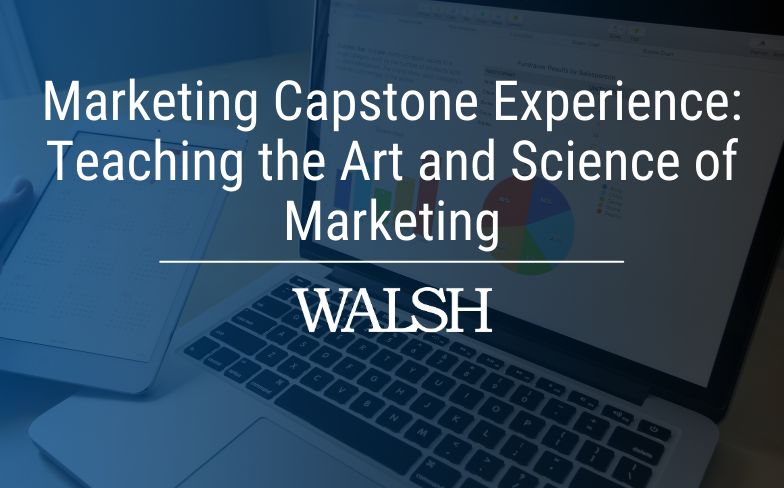Clinical assistant professor of marketing Nicholas McCracken discusses how capstone courses prepare Walsh marketing students to become next-level brand managers. McCracken has years of senior-level industry experience working in market research, as part of a business incubator and in media. He now leads a strategic research group at Ford Motor Company.
McCracken collaborated with Michael Levens, Ph.D., president and CEO and former chair of the marketing department, to develop Walsh’s undergraduate and graduate marketing capstone experiences.
Can you explain Walsh’s marketing capstone course?
The capstone project is the culmination of the master’s of marketing program. Working in teams, students create marketing proposals for a real company and product. The deliverables for each consulting project are based on the scope of the project requested by the external client. Sometimes students create a comprehensive, full stack marketing plan. Other times they are asked to focus on one element of the marketing plan, such as branding or promotion. As is the case in industry, what is delivered varies by the client engagement.
Why are capstone projects important?
The capstone project provides students with practical, hands-on experience they will use in in their professional lives, underscores the importance of working together in teams, and fosters creative thinking. Completed capstone projects showcase to potential employers the marketing skills a student has gained, signaling professionalism, value, and out-of-the-box thinking. The project also allows students to synthesize what they’ve learned on a theoretical and practical level.
How do you assign capstone projects?
Walsh faculty members select the capstone opportunity, relying heavily on our industry connections to bring businesses and products that offer high learning potential. Some of our previous capstone projects include clients in high tech automotive manufacturing, healthcare systems, and new business startup competitions. Students get an inside view into these companies; one client even participated in his client brief from inside the manufacturing location, providing students a virtual tour of the facility. It’s an authentic experience from start to finish.
How can a student be the most successful in their capstone experience?
Students who are passionate about marketing tend to gain the most from their capstone projects. But beyond passion, students willing to dive in, even when they might not feel 100% confident, will also learn the most. It’s natural to feel unsure when they are beginning, because the capstone assignment is intentionally unstructured. But if students are open to the fact that not knowing exactly how to proceed is a valuable part of the learning experience, they’ll come away with confidence and the ability to create an interesting product and package of concepts for their clients.
What do you hope students learn from their capstone experience?
One of the most important things I want students to take away from their capstone experience is confidence. If they don’t know how to solve a particular marketing challenge, they’ve got to stick with the problem until they’ve found a viable solution. I want them to learn to discuss challenges with one another and be able to come to a consensus. I also want them to learn to create marketing ideas based on data, not opinion. That’s the science of marketing. Finally, I want them to understand the value of the story they tell about a product. That’s the art of marketing. The capstone experience helps students combine the art and science of marketing into one practical, valuable marketing strategy.
What makes the Walsh capstone experience valuable?
Many Walsh faculty continue to work in their chosen field while they teach, and students benefit from first-hand, relevant industry experience and professional connections. In fact, students often report they are able to take what they learned in class and put it into practice the next day at work. By working directly with a client, students gain a true understanding of the emotional and financial investment clients make in their marketing strategies, which can ultimately help them become effective brand managers. Faculty act as coaches and facilitators, helping students absorb and synthesize what they’ve learned.
How does Walsh prepare students for their careers?
Walsh’s mission is to provide a transformative business education that combines theory, application, and professional experience to prepare graduates for successful careers. We take that mission seriously, and believe our students deserve a return on investment for the time, energy, and financial resources they commit to their program. That’s why our curriculum balances theoretical learning with hands-on learning experiences for practical skill development, culminating in completion of the capstone experience. Capstone projects gives students the knowledge, experience and skills they need to be successful and helps them prepare for the rapid, high-stakes situations they’ll face in their careers with real clients.






